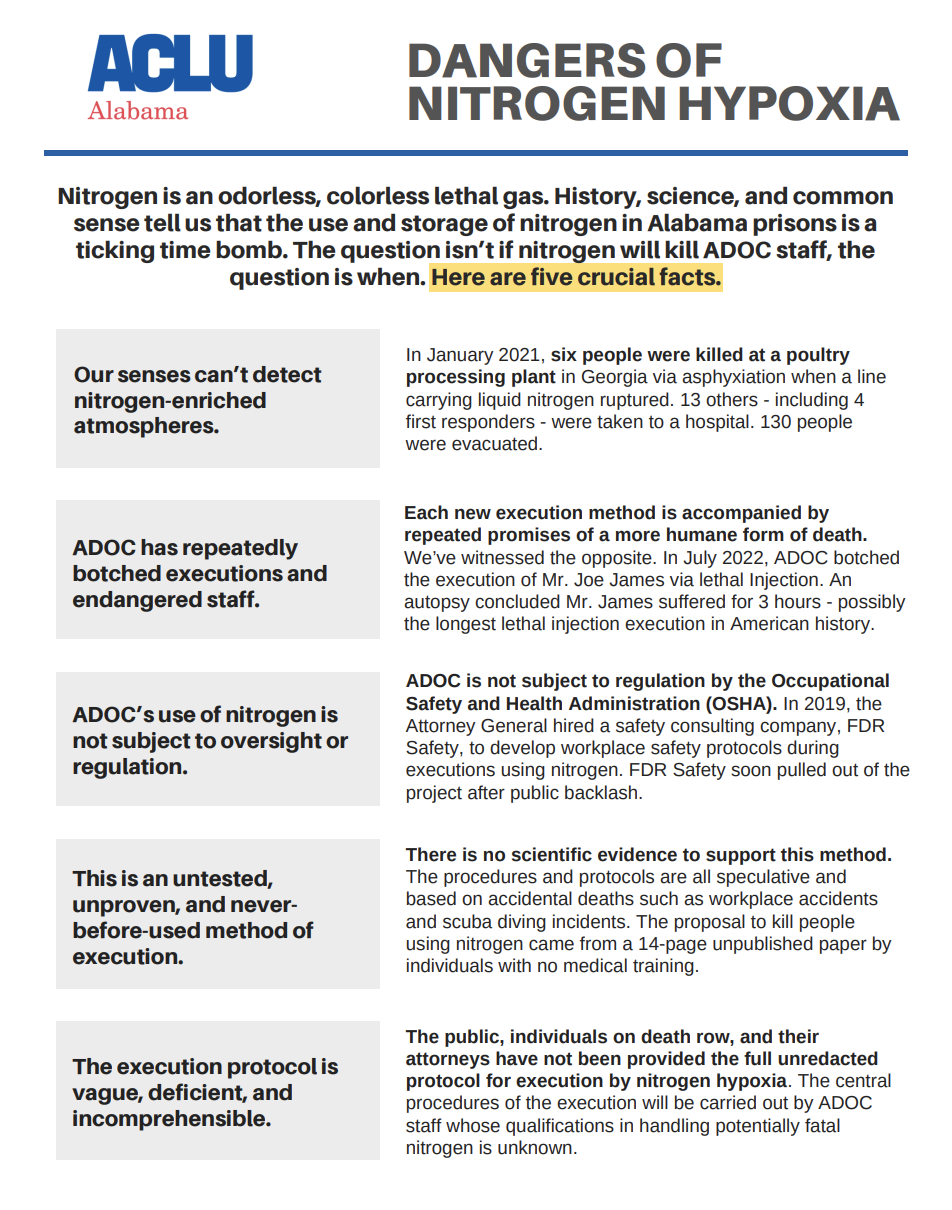On January 25, the state of Alabama will attempt to execute Kenneth Smith using nitrogen hypoxia, forcing him to inhale pure nitrogen through a mask until he suffocates. This will be the first time in United States history that nitrogen gas has ever been used to execute a person.
Earlier this month, United Nations human rights experts warned that the untested execution method might result in a painful and humiliating death. Moreover, it is likely to constitute torture, violating international human rights treaties ratified by the U.S. Last week, the U.N. High Commissioner for Human Rights, Volker Türk, urged Alabama state authorities to cancel the execution.
Veterinary scientists, who have carried out laboratory studies on animals, have even largely ruled nitrogen gas out as a euthanasia method due to ethical concerns. Authorities in the U.S. and Europe have issued guidelines discouraging its use for most mammals, citing potential distress, panic, and seizure-like behavior.
Mr. Smith shouldn’t even be on death row. In 1996, a jury of his peers voted 11-1 for life in prison for his role in a 1988 killing. However, the sentencing judge imposed the death penalty anyway. If Mr. Smith were tried today, that could not happen, as Alabama no longer permits a judge to override a jury’s decision to sentence someone to life without parole.
If the state proceeds, it will be Alabama’s second attempt to execute Mr. Smith. In 2022, the Alabama Department of Corrections failed to find a suitable vein during a lethal injection attempt, calling it off after hours of needle insertions.
Attempting to kill Mr. Smith, or any other person, by nitrogen gas is cruel and inhumane. Plans to do so should be abandoned for those reasons alone – but there are others. Nitrogen gas presents a grave danger to prison staff, incarcerated people, and the public. The Alabama Department of Corrections is aware of the risks, evident in requiring Mr. Smith’s spiritual adviser to sign a waiver acknowledging he could be at risk of gas exposure if he chooses to be with Mr. Smith at the execution.
A recent tragedy at a Gainesville, Georgia poultry plant underscores the dangers of nitrogen gas. Following a leak that filled a freezer room, five workers entering it collapsed and died. A sixth worker was pronounced dead at the hospital. After evacuating 130 workers, an additional 13 people, including four first responders in safety gear, required hospitalization and intensive care.

The tragedy in Georgia is no outlier. The U.S. Chemical Safety Board reports an annual average of 8 deaths and 5 injuries from nitrogen exposure. History, science, and common sense tell us that storing and using nitrogen in Alabama prisons, or elsewhere, is a ticking time bomb. The question isn’t whether nitrogen gas will kill staff and incarcerated people; the question is when.
Governor Kay Ivey has the authority to stop Mr. Smith’s execution by nitrogen gas; or any other method proposed. And she must exercise that power.
But, we must also abolish the death penalty in Alabama and in the U.S. entirely. The justifications for ending it go beyond the cruel, dangerous, and tortuous methods employed. It’s a barbaric practice that too often condemns wrongly-convicted individuals to die and disproportionately kills people of color, people with low-income, people with intellectual disability, people living with mental illness, and others who are over-targeted for arrest and incarceration.
The U.S. must stop inventing new and more heinous methods of execution, and put an end to it once and for all.
Published January 19, 2024 at 11:38AM
via ACLU (https://ift.tt/WRPjiga) via ACLU
